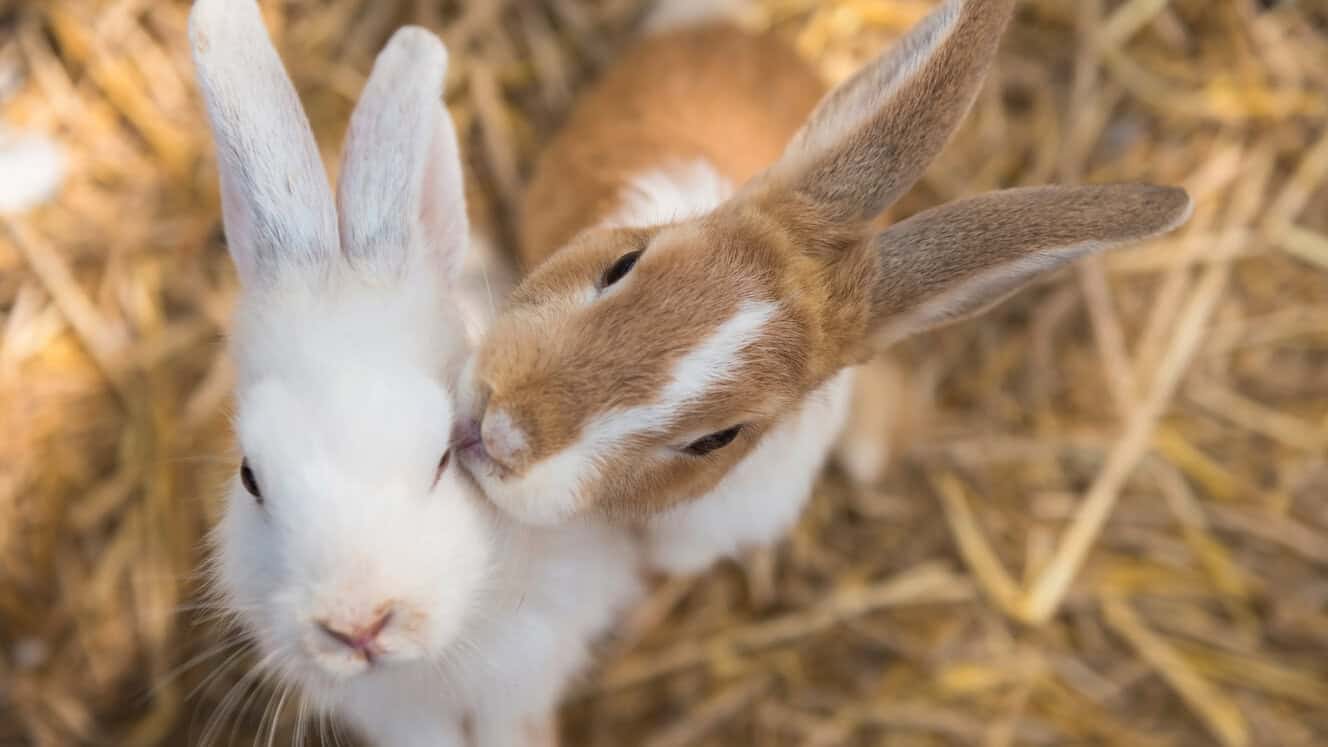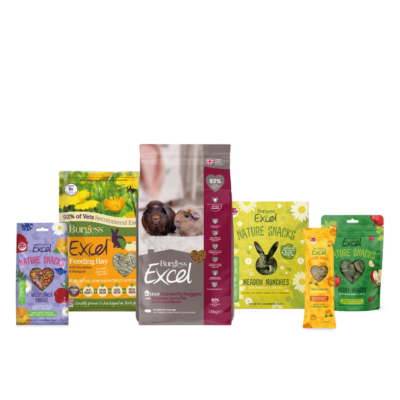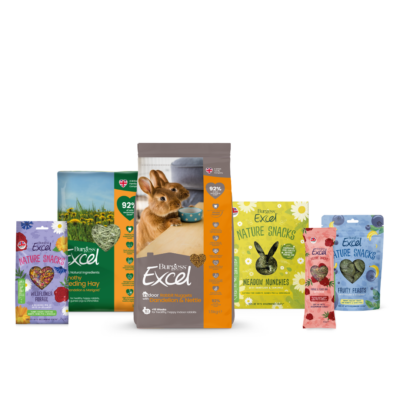

Expert approved
Rabbits and, in particular, guinea pigs are sensitive to temperature fluctuations. So, as autumn starts to show its colours – along with chilly winds, freezing frosts and ferocious storms – it’s essential to keep a close eye on what the weather is doing.
Burgess in-house vet Dr Suzanne Moyes advises: “Prolonged exposure to cold temperatures can lead to serious health issues such as hypothermia and respiratory infections in rabbits and guinea pigs. If they have suitable accommodation, healthy guinea pigs and rabbits can stay outdoors all year round. However, very young or elderly small pets, or those suffering from a health condition, should be brought inside once temperatures drop below 10°C overnight. Think of it this way – if it feels too cold for you to sit outside in just a jumper, then it's likely too cold for most small animals to cope with.”
Veterinary charity PDSA says: “Our small pets can really feel the cold and changes in weather and are very susceptible to temperature changes. A sudden drop in temperatures can be a real shock to the system, but there are a number of things you can do to help them.”
What’s the best bedding for small pets? >>
***AUTUMN SPECIALS!***
Brighten up the dull days of autumn for your small furries with delicious, nutritious healthy snacks that are perfect for hand feeding and mixing in with hay for the ultimate foraging experience! And keep your eyes peeled for the arrival of our yummy Winter Berry Bakes, packed with cranberry and apple, for that perfect seasonal forage treat!
How cold is too cold for rabbits and guinea pigs?
- Rabbits – The RSPCA recommends a temperature of between 10-20°C as ideal for pet rabbits. Anything below 10°C is too cold for them.
- Guinea pigs – These small furries are very sensitive to temperature changes. Temperatures below 15°C can cause guinea pigs to become chilled.
As a caring small pet owner, your options are to either set your rabbits or guinea pigs up with suitable, spacious and safe accommodation indoors, or ensure their outdoor enclosure is warm, cosy and weather-proof.
Is your small pets’ outdoor accommodation up to the job?
Dr Moyes advises: “If you do just one thing before the autumn storms hit, it should be giving your pet's home a thorough inspection. Look out for any potential dangers or areas where bad weather could permeate, such as leaks or damp patches, weak joints or broken latches. Even a minor leak in an enclosure can leave small animals cold and stressed. Conducting this quick check now can prevent a winter of health problems."
- Outdoor pet housing should be elevated off the ground to prevent rising damp and should be sheltered from wind and rain.
- Add extra waterproof covers, protective tarpaulin, or windbreaks to create a makeshift storm shelter during particularly harsh weather.
- Insulate the interior using straw or specialist pet-safe small animal bedding.
- Ensure there is plenty of fresh, dust-extracted, high-quality hay for snuggling in and nibbling on.
- A converted garden shed or a Wendy house is a great option for keeping outdoor rabbits or guinea pigs protected from bad weather in the winter.
Practical ways to help your small pets get set for winter >>
***AUTUMN SPECIALS!***
Check out our fabulous range for gorgeous guinea pigs – from nutritious nuggets – including Indoor Guinea Pig Nuggets with Calm formula – and tasty feeding hay to healthy snacks your piggies will love nibbling on! And don’t miss out on our chew-tastic Forage and Meadow Hay, Forage and Timothy Hay and Indoor Guinea Pig bundles!
What’s important to know when moving small pets indoors?
Dr Moyes advises: “It’s crucial to establish a comfortable, steady climate for them. The ideal internal temperature varies depending on your pet. Rabbits and guinea pigs generally thrive in indoor temperatures of around 15-20°C.”
Animal welfare charity Blue Cross advises: “If your guinea pigs have been living outside then, after a settling in period to adjust to being indoors, most guinea pigs will happily live inside your home as part of the family.”
How to create an ideal home for your indoor guinea pigs >>
Veterinary charity PDSA adds: “If you decide to bring your rabbits into your house, remember it can take them a few days to adjust to big temperature changes. Suddenly moving them into a warm room in your house from the chilly outdoors can be hard for them. Try to move them before the temperature outside drops too low, or think about moving them somewhere sheltered for a few days first to let them adjust to a slightly higher temperature, for example, a shed or porch, before bringing them into the house.”
Perfect habitats for indoor rabbits >>
- When bringing rabbits and guinea pigs indoors, you’ll need to provide a roomy enclosure, such as a large rabbit hutch or guinea pig pen, situated in a quiet part of your home.
- Provide plenty of warm, absorbent bedding such as hay or paper bedding to keep them cosy and snug.
- Make sure the room is well-ventilated, but free from drafts and has natural light. Keep their enclosure away from radiators or heating vents to avoid overheating.
- Maintain your pets' regular feeding and cleaning routine. Keep their diet consistent, and ensure they have access to fresh water and hay at all times.
***AUTUMN SPECIALS!***
Get your bunnies nice and cosy with our Indoor Rabbit bundle! Combining six of our quality Burgess Excel products, it includes the world’s first indoor rabbit nuggets specially formulated with vitamin D, dandelion & nettle to support your rabbits’ needs, feeding hay with dandelion and marigold and a selection of healthy Nature Snacks!
SEASONAL TOP TIPS FOR KEEPING YOUR SMALL FURRIES HAPPY AND HEALTHY
- NUTRITION Small pets may need a little more food in winter to maintain their body temperature and condition, so allow for this when serving up their daily nuggets. As fresh grass is less readily available, bunnies and piggies will require plenty of good-quality feeding hay to munch on. Never feed greens or vegetables that are frosty or frozen.
- HYGIENE Outdoor pets will also need cleaning out daily to keep things dry and hygienic – a damp environment in freezing weather will seriously affect their health.
- HYDRATION Regularly check water bottles and bowls to ensure the contents haven’t frozen up and the spout is still working, as small furries need to drink plenty of fresh water each day.
- ENRICHMENT Spending quality time with your small pets is essential throughout the year – interacting with their human is a highlight of their day. It’s perhaps even more important in autumn and winter when the days are short, and life can get a bit boring – both for us and our pet animals! Keep daily feeding and exercise times consistent and schedule in some time every day for play, grooming and some extra special attention.
NEED SOME EXPERT FEEDING TIPS?
If you are at all unsure about the best way of feeding your rabbits or guinea pigs, or have any concerns about specific nutritional requirements, ask your local veterinary practice for advice. You can also call our expert team on 44 (0)0800 413 969 who’ll be happy to help. They’re available 9am-5pm, Monday to Friday. Alternatively, you can use our online form to get in touch.
SERVE UP ONLY THE VERY BEST DINNER FOR YOUR SMALL PETS!
Our small pets deserve a high-quality diet that’s created just for them. At Burgess, all our food for rabbits and guinea pigs is made at our factory in the heart of Yorkshire, using only ingredients that meet our stringent specifications.
With a long tradition of supporting British farmers, we actively source all our ingredients as close to our mill as possible and have launched many innovations. These include the world’s first food specifically formulated for indoor rabbits andthe world’s first indoor guinea pig nuggets, which are made with a Calm formula.
*It’s no surprise that 92% of UK vets recommend our Burgess Excel small pets range!*
What should I feed my guinea pigs? >>
Rabbit nuggets – how to choose what’s best for your buns >>
CARE MORE Find lots of useful advice on caring for your rabbits and your guinea pigs from Burgess, the pet experts.
Join the Burgess Pet Club for exclusive offers, competitions and expert advice from our in-house vet, Dr Suzanne Moyes.
LET’S GET SOCIAL! Sign up to the Excel Bunny Base or become part of the Excel Squeak Squad on Facebook. Find lots of advice and friendly discussions from like-minded owners – and there are lots of cute bunny and piggy photos and videos! Also join us on Instagram.
If you found this interesting, you may also like:
THE SECRET TO HEALTHY, HAPPY GUINEA PIGS In order to help your guinea pigs live their best lives, it helps to see things from their perspective.
WHAT DO RABBITS, REALLY REALLY WANT? Ever wished you could speak rabbit, so you understand exactly what your bunny buddies require to be happy and healthy? If our pet rabbits could speak human, here are 8 things they’d tell us!
RABBITS AND GUINEA PIGS – IS INDOORS OR OUTDOORS BEST? Is the outdoor life better for bunnies and guinea pigs, or will these small pets have a more enriching time if they’re kept indoors?
WHAT PUTS YOUR SMALL PETS IN A GOOD MOOD? Along with socialising with their same species companion and interacting with their favourite human, our survey reveals the best thing you can to do to give your small furries a happiness boost…
DO YOUR SMALL PETS HAVE THE RIGHT TO ROAM? Find out why giving small furries the chance to scamper about in a safe, enriching space is essential to their health and wellbeing.
WISE UP TO WINTER COLDS AND FLU During the winter, it’s not only us humans that can feel a little under par. Our pets can also be susceptible to a range of unpleasant illnesses and infections.
WHY GOOD HOUSEKEEPING IS A SMALL PET ESSENTIAL Keeping your small pets’ home clean and dry is super important. Dirty, damp bedding not only creates an unhealthy environment for small furries, but it will also become a magnet for all manner of pests.
FINDING A VET FOR YOUR SMALL PETS Did you know that just like hospital specialists, vets have different areas of expertise? That’s why, if you have small pets, it can be a good idea to seek out a vet that specialises in small animal medicine.
COST EFFECTIVE WAYS TO LOOK AFTER YOUR SMALL PETS How to create DIY boredom breakers and ways to upcycle old furniture and unwanted items from around the house into interesting features for your pets’ environment.
21 AMAZING RABBIT FACTS FOR BUNNY FANATICS Even if you’re a lifelong bunny lover, there are a few things you may not know about your hay-chomping chums.
FEEDING YOUR JUNIOR GUINEA PIGS – WHY THEY DON’T NEED LIFE STAGE FOOD Unlike puppies, kittens and baby rabbits, baby guinea pigs are born fully formed and eat solid food almost straight away. So, what do they need from their diet?
HOW TO CREATE A HAPPY, HOPPY HOME FOR YOUR RABBITS Your rabbits’ living space has a big impact on how healthy and happy they are. That’s why creating the best rabbit residence you can is so important. Our top tips show you how.
HOW MUCH SPACE DO YOUR RABBITS NEED? If you have a couple, a throuple or even a band of well-bonded bunnies, you’ll know just how much they love hanging out together. However, even the best bunny pals need their own space.
LOST IN TRANSLATION? GUINEA PIG SPEAK EXPLAINED Guinea pigs are sociable, chatty creatures who generally have plenty to say. Getting to know what the various piggy sounds means will help you understand your pets better and identify when they’re happy and excited or fearful and unwell.
BUNNY TALK Rabbits have a complex language all of their own. By learning to understand their body postures, behaviours and vocalisations, you’ll uncover their individual personalities.
GAMES TO PLAY WITH YOUR RABBITS Bunnies are smart and active creatures who like lots of things to do and games to play – particularly if there are some tasty rabbit treats involved. We’ve some fun ideas to add interest and excitement to your buns’ day.
HOW TO HELP YOUR BUNNIES GET ALL THE EXERCISE THEY NEED To encourage your bunny chums to like to move it, move it, create an exciting space where they can hop, run, jump, explore and forage.
LITTER TRAINING YOUR RABBITS Whether your buns live indoors or out, litter training has lots of benefits – both for them and you!
HOW DO YOU GROOM RABBITS? Keeping clean and neat is very important to rabbits and, just like cats, buns spend a huge amount of time grooming themselves. They also need a little help from us.
HOW TO GROOM YOUR GUINEA PIGS From the brush and browse, ear clean, dental check and nail trim to the grease gland wipe, discover more about the essentials of guinea pig grooming.
WHICH POPULAR RABBIT BREEDS HAVE THE MOST HEALTH ISSUES? ‘Cute’ bunny breeds such as the Lionhead rabbit, the Netherland Dwarf rabbit and the Mini Lop, are at risk from long-term health problems.
BONDING WITH YOUR BUNNY CHUMS Whether your buns are already part of the family, or you’ve just welcomed some new rabbits into your family, find out how to deepen your connection with your nose-twitching pals.
SMALL FURRIES NEED A SECOND CHANCE TOO As well as taking on a rescue dog or adopting a cat from an animal sanctuary, did you know that there are lots of small furries in rescue centres around the country that are looking for loving homes?
PET INSURANCE EXPLAINED Can you get pet insurance for pre-existing conditions? Can you get pet insurance for older pets? Can you get multi-pet cover? We answer some of the most commonly asked questions to help you make an informed decision.
















